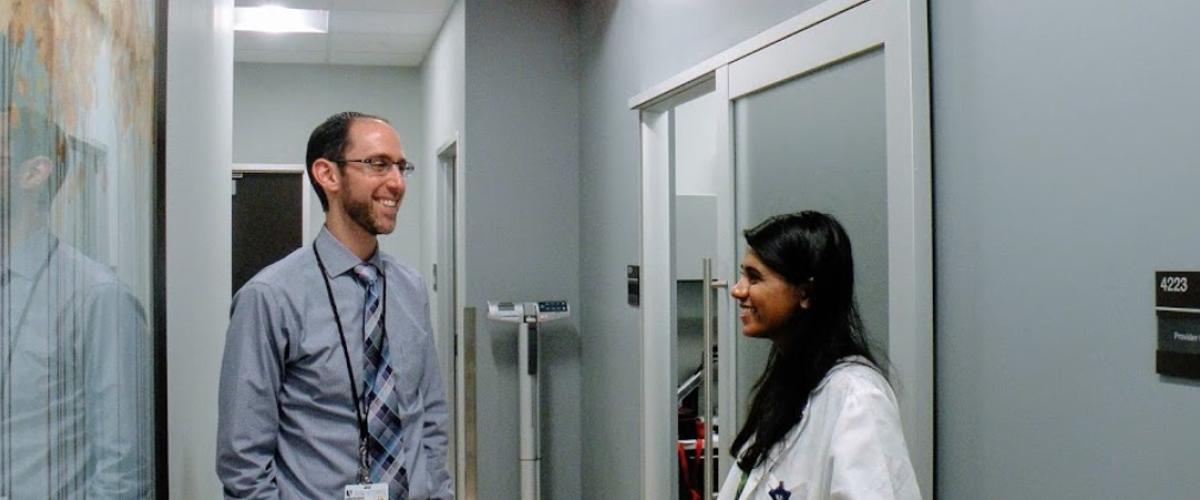
The Duke University Sleep Medicine Fellowship is a one-year, ACGME-accredited program that emphasizes advanced training in the interpretation of sleep testing and the diagnosis and management of sleep disorders, with up to two trainees a year.
Trainees will gain extensive experience interpreting in-lab polysomnograms, home sleep tests, and multiple sleep latency tests. They will see patients in academic and community settings, providing broad exposure to all of sleep medicine as it is practiced in various settings. Training in both adult and pediatric sleep medicine is provided.
The Duke Department of Neurology recognizes that a community where people of all backgrounds are respected and included – including its clinicians, researchers, trainees, leadership, and staff – is a necessary part of its mission of world-class patient care, education, and research. Read more about our efforts across the Department.
The fellowship is based at Duke University Medical Center (6 months) and the Durham Veterans Affairs Medical Center (6 months) with clinical experiences in several local sleep clinics. The Duke Sleep Disorders Center is accredited by the American Academy of Sleep Medicine and is located near Duke's campus in Durham. The Durham VAMC has its own sleep lab. Both labs perform studies seven nights per week. A associated pediatric sleep lab provides fellows the opportunity to interpret pediatric sleep studies.
Prerequisite: Completion of an ACGME, CFPC, or RCPSC accredited residency in Neurology, Child Neurology, Psychiatry, Internal Medicine, Family Medicine, Pediatrics, Otolaryngology, or Anesthesiology.
Salary Level: Commensurate with experience (e.g. graduates of a 3-year internal medicine residency will be paid at the PGY-4 level).
The Duke Sleep Disorders Center in Durham, North Carolina, and the Durham Veterans Affairs Medical Center (VAMC) Sleep Disorders Center, offer fellows the chance to train in a variety of clinical settings. Fellows rotate through a variety of adult general sleep and sleep apnea clinics along with pediatric sleep clinics and have the opportunity to work with otolaryngologists who perform sleep surgeries, psychiatrists, sleep dentists, and obesity medicine specialists.
The sleep medicine physicians at Duke come from backgrounds in neurology, psychiatry, pulmonary, pediatric pulmonary, pediatric neurology, family medicine, and otolaryngology, providing the fellows with a multi-disciplinary approach to training.
The faculty of the Duke Sleep Disorders Center include internationally recognized leaders in the field who welcome fellows to work on a variety of ongoing research projects. Fellows are encouraged to participate in ongoing scholary activities or develop ones of their own.
Didactic sleep conference is held weekly. This includes, Sleep Medicine Grand Rounds, a case conference to discuss difficult sleep medicine patients, and a journal club. Sleep medicine fellows also attend the Neurology fellows general education conference monthly.
The sleep medicine fellows have the opportunity to work one-on-one with sleep technologists to learn about scoring sleep studies and have access to the AASM scoring course.
Conferences
- Sleep medicine interesting case conference
- Sleep medicine Grand Rounds
- Sleep journal club
- Neurology Grand Rounds
- Neurology Fellows Conference
Clinics
- Sleep continuity clinic
- Obstructive sleep apnea clinic
- Pediatric sleep clinic
- ENT clinic
- Obesity Medicine clinic
Apply for our Sleep Medicine Fellowship through ERAS. Interviews will be held between August and October for Fellowships starting on July 1 of the following year. The Duke Sleep Medicine Fellowship Program participates in the National Residency Matching Program (NRMP). Two positions are available every year.
Applicants should review the employment requirements for all Duke graduate medical education trainees. Applicants who do not qualify for employment cannot be ranked.
Our next application season will be in the summer/fall of 2026 with a fellowship start date of July 2027. We will not be accepting applications for the 2026-2027 academic year.
Christine Berry
Program Coordinator
Andrew R. Spector, MD, FAASM, FAAN
Director, Sleep Fellowship Program

